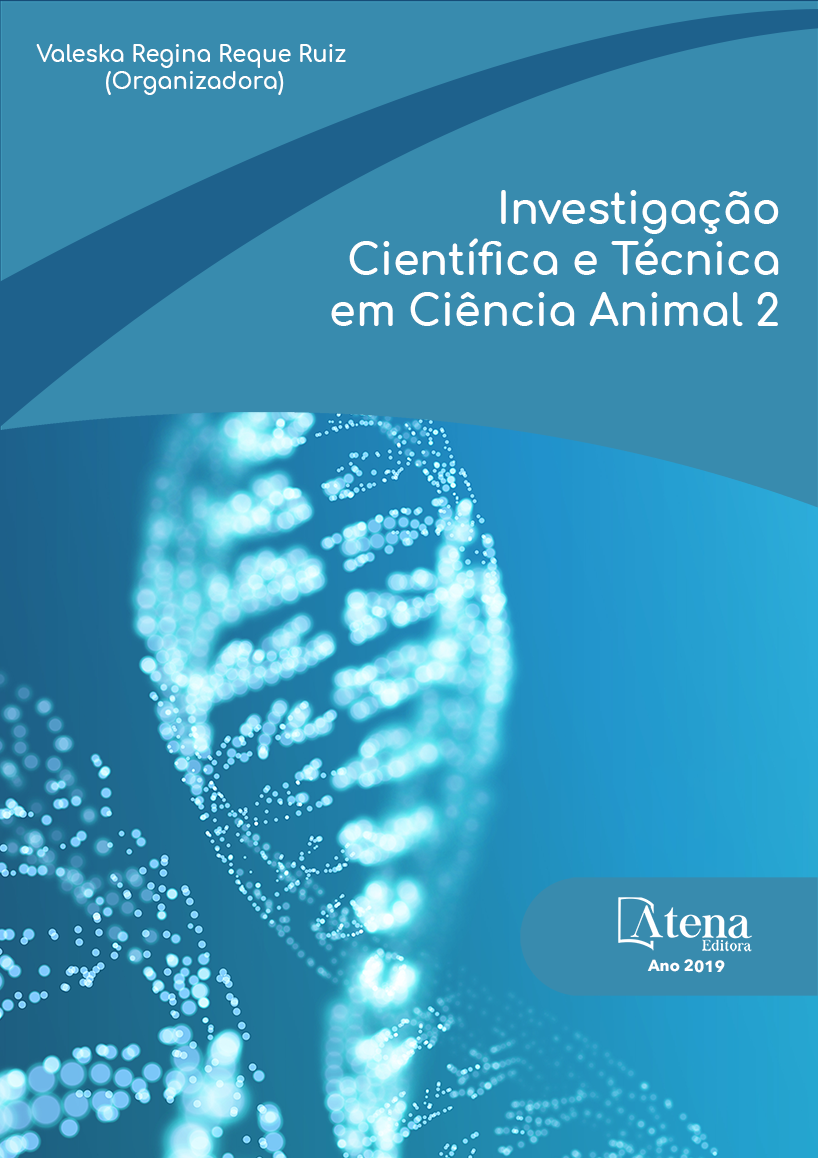
DESEMPENHO DE COELHOS DE CORTE COM E SEM SUPLEMENTAÇÃO COM CAPIM ELEFANTE (PENNISETUM PURPUREUM)
objetivo deste trabalho foi estudar o
desempenho de coelhos na fase de crescimento
alimentados com rações comerciais com e
sem a suplementação de capim elefante.
Para tal, conduziu-se ensaio biológico com 18
coelhos da raça Nova Zelândia, de ambos os
sexos com idade inicial de 58 dias. Os coelhos
foram distribuídos aleatoriamente em gaiolas
individuais onde receberam ração e água a
vontade. Os dois grupos estudados foram: Ct
– grupo controle que recebeu apenas ração
comercial e grupo CE – que recebia ração
comercial e capim elefante a vontade no
período da manhã. Durante o ensaio biológico,
o peso dos animais, o desperdício, as sobras
e consumo eram registrados semanalmente. O
ensaio biológico teve duração de 28 dias, e os
animais idade final de 86 dias. As medias de
desempenho de cada fase foram submetidas
a Analise de Variância das Médias (ANOVA).
Os animais do grupo CE apresentaram melhor
desempenho quando comparados com Ct
nas fases de crescimento I (58 aos 65 dias),
terminação I (72 aos 78 dias) e terminação II
(78 aos 86 dias). Sendo assim, apenas durante
uma das quatro fases estudadas (65 aos 72
dias) os animais não apresentaram diferença
nos parâmetros de desempenho. Ainda é válido
ressaltar que nesta fase houve um grande
desperdício no grupo CE. Com base nos dados
obtidos concluiu-se que o uso de capim elefante
para coelhos como complemento para a ração
é viável. Nesse sentido o volumoso em questão
tende a melhorar a conversão alimentar e o
ganho de peso dos animais.
DESEMPENHO DE COELHOS DE CORTE COM E SEM SUPLEMENTAÇÃO COM CAPIM ELEFANTE (PENNISETUM PURPUREUM)
-
DOI: 10.22533/at.ed.26319120915
-
Palavras-chave: Cunicultura; engorda de coelhos; gramíneas
-
Keywords: Cuniculture; grasses; growing rabbits.
-
Abstract:
The aim of this work was to study
the performance of rabbits in the growth phase
fed with commercial diets with and without
elephant grass supplementation. For this, a
biological assay was conducted with 18 New
Zealand rabbits with initial age of 58 days. The
rabbits were randomly distributed in individual
cages where they received feed and water ad libitum. The two groups studied were:
Ct - control group that received only commercial ration and CE group - that received
commercial ration and elephant grass at will in the morning. During the biological test,
animal weight, waste, leftovers and consumption were recorded weekly. The biological
assay lasted for 28 days, and the animals aged 86 days. The performance measures
of each phase were submitted to Analysis of Mean Variance (ANOVA). The animals
in the CE group presented better performance when compared to Ct in the growth
stages I (58 to 65 days), termination I (72 to 78 days) and termination II (78 to 86 days).
Thus, only during one of the four phases studied (65 to 72 days) did the animals show
no difference in the performance parameters. It is still worth mentioning that at this
stage there was a great waste of CE by animals. Based on the data obtained it was
concluded that the use of elephant grass for rabbits as a complement to the feed is
feasible. In this sense, the bulk in question tends to improve the feed conversion and
the weight gain of the animals.
-
Número de páginas: 15
- Diuly Bortoluzzi Falcone
- Geni Salete Pinto de Toledo
- Aline Neis Knob
- Leila Picolli da Silva
- Ana Carolina Kohlrausch Klinger


